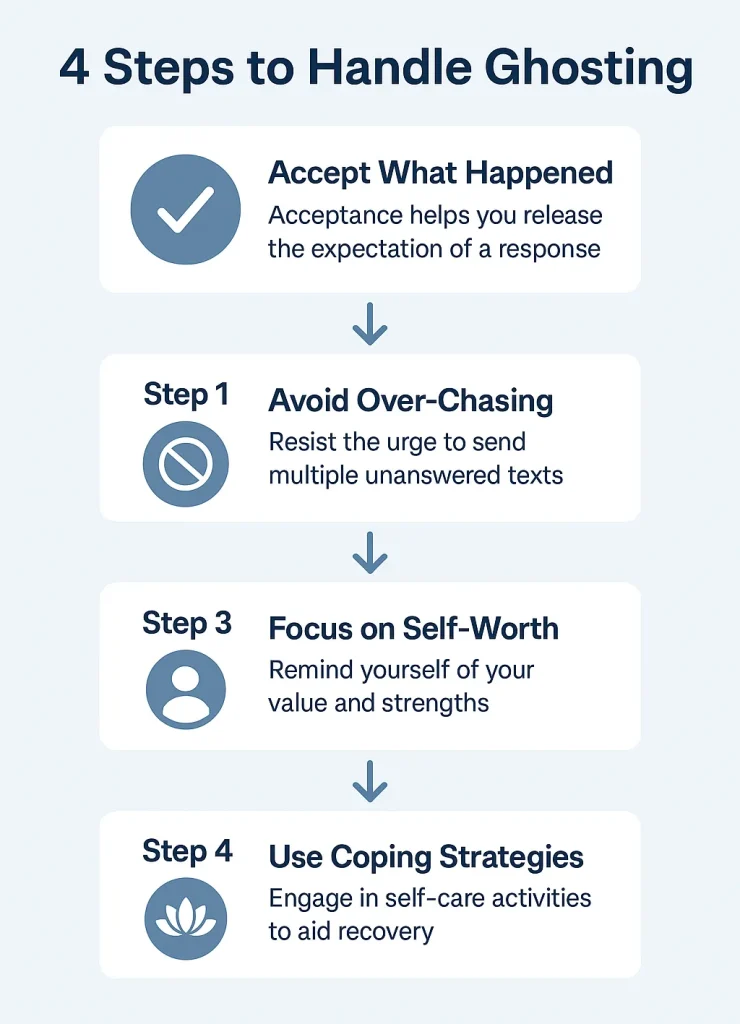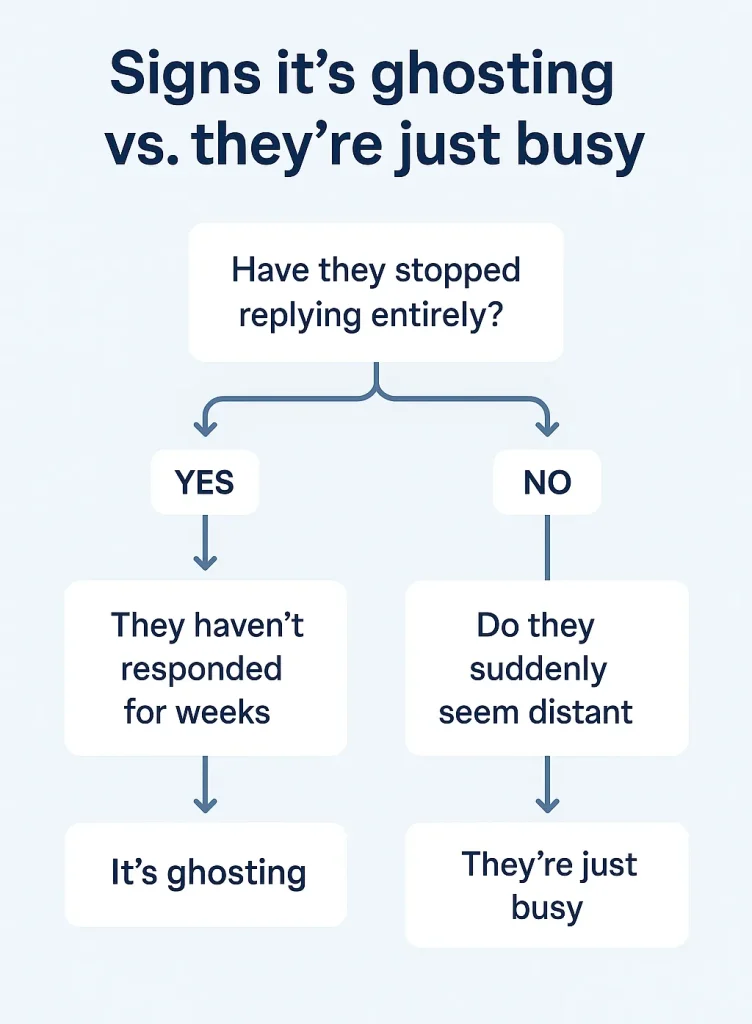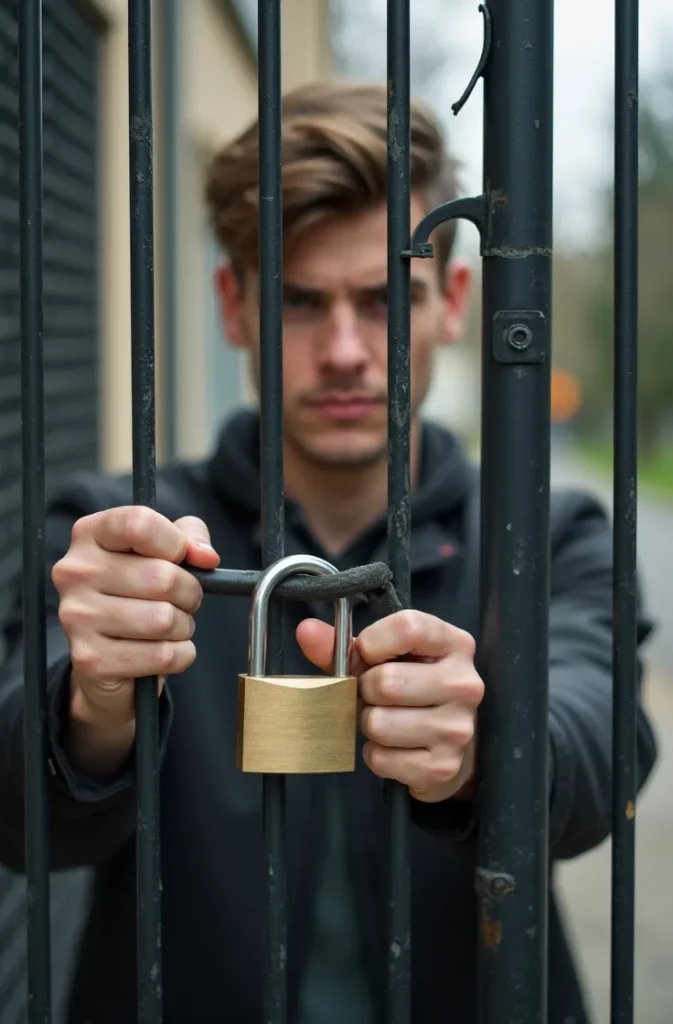Getting ghosted can be painful and confusing. One day, you’re chatting or going on dates, and the next—silence. No explanation. No closure. Ghosting can feel like rejection without reason, leaving you wondering what went wrong.
So, how do you handle ghosting? The best approach is to accept what happened, avoid chasing for answers, and focus on your own healing and self-worth. By shifting attention back to yourself, you protect your confidence and keep moving forward.
The positive side is that you can learn to handle ghosting in a healthy way. This guide walks you through practical steps to cope, move forward, and protect yourself in future relationships.
Definition of Ghosting
Ghosting = the sudden, unexplained cutoff of communication in a relationship, whether in dating, friendships, or professional settings.
Key Takeaways
- Accept and move forward: Ghosting is about the other person’s choice, not your worth—acceptance helps you reclaim peace of mind.
- Don’t chase for answers: Over-texting or seeking closure often deepens frustration; silence is sometimes the healthiest response.
- Focus on self-care: Journaling, therapy, or supportive friendships are powerful tools to heal and rebuild confidence.
- Recognize patterns: Understanding why people ghost and spotting early red flags can protect you from repeat experiences.
- Build stronger connections: Setting boundaries and choosing partners who value honesty reduces the chances of ghosting in the future.
How to Handle Ghosting in a Healthy Way

When someone disappears without explanation, it’s important to respond with self-respect and practical strategies.
When I was ghosted for the first time, I remember feeling confused and checking my phone constantly for a reply that never came. Over time, I realized the most helpful step was acceptance—understanding that their silence said more about them than it did about me. That shift helped me move forward without obsessing over closure.
Step 1: Accept What Happened
The first step is acknowledging reality. If someone stops replying, it doesn’t mean you’re unworthy—it means they chose not to communicate. Acceptance frees you from waiting on answers that may never come and helps you redirect your energy toward healing.
Step 2: Avoid Over-Chasing or Over-Texting
It’s natural to want clarity, but sending message after message rarely gets results. Instead, it can make you feel more powerless. By resisting the urge to chase, you protect your dignity and keep your self-control intact.
Step 3: Focus on Your Self-Worth and Boundaries
Ghosting reflects their behavior, not your value. Remind yourself of your strengths, achievements, and qualities. Setting boundaries—like deciding not to tolerate repeated ghosting—helps ensure you’re investing in healthier connections.
Step 4: Use Coping Strategies for Emotional Recovery
Ghosting can sting, but self-care softens the impact. Meditation, journaling, exercising, or simply giving yourself time to grieve are all healthy ways to rebuild emotional balance. The goal isn’t to erase the hurt instantly but to allow yourself to recover gradually.
Practical Tips to Move Forward After Ghosting

Moving forward means finding ways to process emotions and rebuild confidence.
Journaling and Self-Reflection
Writing down your thoughts and feelings helps untangle confusion. Journaling can reveal patterns in how you connect with people and may even highlight what you truly want in a relationship.
Exploring topics like being single and lonely can also provide insights and comfort during this time.
Talking to Friends or a Therapist
Support systems are vital when dealing with rejection. Trusted friends can offer empathy, while a therapist can provide tools to manage self-esteem, trust issues, and coping mechanisms more effectively.
For those experiencing social withdrawal or isolation, resources on social isolation may be helpful to understand and overcome feelings of loneliness.
Reframing the Experience as a Lesson
Instead of seeing ghosting as failure, reframe it as redirection. This person showed you they’re not ready for honest communication, which spares you from deeper disappointment later. Seeing ghosting as a filter makes it easier to move on.
Exploring AI Companionship as Support
If you’re feeling lonely or finding the dating world tough, you might consider a different kind of companion—an AI girlfriend. These AI-powered relationships can adapt to how you feel and offer a kind of connection that’s always there when you need it.
Curious about how it works? Check out What is an AI girlfriend to learn more about this modern way to build a meaningful connection alongside real-life relationships.
How to Respond (or Not Respond) to a Ghoster
Deciding whether to respond depends on your emotional needs and what outcome you want.
When It’s Best to Say Nothing at All
Sometimes, silence is the strongest response. Choosing not to reply reclaims your power and avoids feeding into confusion. By stepping back, you also send the message that your time is too valuable for games.
Polite, Boundaried Messages (If You Feel Closure Is Needed)
If silence doesn’t feel right, keep your response short and respectful. A message like, “I noticed we haven’t been in touch. If you’ve moved on, I wish you the best,” sets boundaries while maintaining self-respect. This way, you close the door on your terms.
What Ghosting Really Means
Understanding ghosting helps you see it as a behavior pattern rather than a personal attack.
Definition of Ghosting in Modern Dating and Friendships
Ghosting is when someone cuts off all contact without warning or explanation. It’s common in dating, friendships, and even professional circles as shown in a research study on online dating.
Why People Ghost Instead of Communicating
People ghost because it feels easier than being honest. For many, avoiding awkward conversations is more comfortable than directly expressing disinterest, even though it leaves the other person hurt and confused.
The Emotional Impact of Being Ghosted
Ghosting isn’t just silence—it often leaves deep emotional marks.
Common Feelings: Confusion, Rejection, Anxiety
You might find yourself asking, “What did I do wrong?” This loop of self-questioning often leads to stress and self-doubt, which can feel heavier than the actual loss of the relationship.
Short-Term vs. Long-Term Effects on Self-Esteem
In the short term, ghosting can feel like a sharp blow to your confidence. If it happens repeatedly, it may cause you to question your worth or develop trust issues that impact future relationships.
Why Ghosting Hurts More Than a Direct Rejection
Unlike a direct “no,” ghosting leaves unanswered questions. The uncertainty lingers, creating mental strain because your brain craves closure. This is why many people say ghosting feels worse than rejection.
How to Recognize When You’re Being Ghosted

Recognizing the signs early helps you avoid wasting energy on one-sided efforts.
Signs It’s Ghosting vs. Just Being Busy
Look for consistency. If days pass without replies, excuses become vague, or they’re active on social media but ignoring you, it’s a strong sign of ghosting.
Early Red Flags to Watch For
Patterns like frequent cancellations, avoiding deeper conversations, or showing minimal effort are all signals that communication may eventually stop altogether.
Why People Ghost: The Psychology Behind It

Ghosting usually reflects the ghoster’s emotional state, not the ghosted person’s worth.
Fear of Confrontation and Conflict Avoidance
For some, ghosting feels safer than dealing with awkward conversations. They’d rather disappear than admit they’ve lost interest.
Lack of Emotional Maturity or Communication Skills
Not everyone has learned how to handle emotional responsibility. Ghosting can signal a lack of growth or unwillingness to be upfront.
Situational Reasons (Stress, Overwhelm, or Other Priorities)
Sometimes ghosting happens because of outside pressures. Stressful life events, shifting priorities, or personal struggles may cause someone to withdraw suddenly.
Preventing Ghosting in Future Connections

While you can’t control others, you can build habits that make ghosting less likely.
Building Clear Communication from the Start
Expressing how you like to communicate sets expectations. People who match your style are more likely to stay consistent.
Setting Boundaries and Expectations Early
If you make it clear you value honesty, you’ll filter out people unwilling to meet that standard. This prevents emotional investment in the wrong person.
Choosing Healthier Relationship Patterns
Pay attention to how people show up for you. Choosing partners or friends who demonstrate reliability and respect reduces the chances of ghosting.
When Ghosting Becomes a Pattern

If ghosting happens repeatedly, it may be worth taking a closer look at patterns in your connections.
Repeatedly Attracting Ghosters: What It Might Mean
This doesn’t mean you’re at fault, but it might suggest you’re drawn to people who avoid emotional responsibility. Recognizing this can help you make better choices.
Steps for Breaking the Cycle
Break the cycle by:
- Recognizing your worth
- Strengthening your boundaries
- Choosing people who demonstrate consistent communication and effort
Final Thoughts on Handling Ghosting
Ghosting hurts, but it’s not the end of your story. By accepting what happened, responding with self-respect, and focusing on your healing, you protect your emotional well-being.
Always remember: ghosting says far more about them than it does about you.
Disclaimer
This article is for informational purposes only and should not be considered a substitute for professional mental health advice. If ghosting or relationship stress is significantly affecting your well-being, consider speaking with a licensed therapist or counselor.
Frequently Asked Questions
Why do people ghost instead of just telling me they’re not interested?
Many people find it really uncomfortable to have honest conversations about their feelings. Instead of facing awkwardness or confrontation, they choose to disappear. It’s not about you—it’s more about their way of avoiding difficult talks.
How can I stop myself from obsessing over being ghosted?
It’s normal to feel confused or hurt, but try to focus on things that make you feel good about yourself. Keep busy with friends, hobbies, or journaling your feelings. Remind yourself that someone’s silence doesn’t define your worth.
Is it ever okay to reach out to a ghoster to ask for closure?
Sometimes people want an answer to move on, but reaching out can also bring more frustration if you don’t get one. If you do decide to send a message, keep it simple and respectful, and be ready to accept that you might not get a reply.





